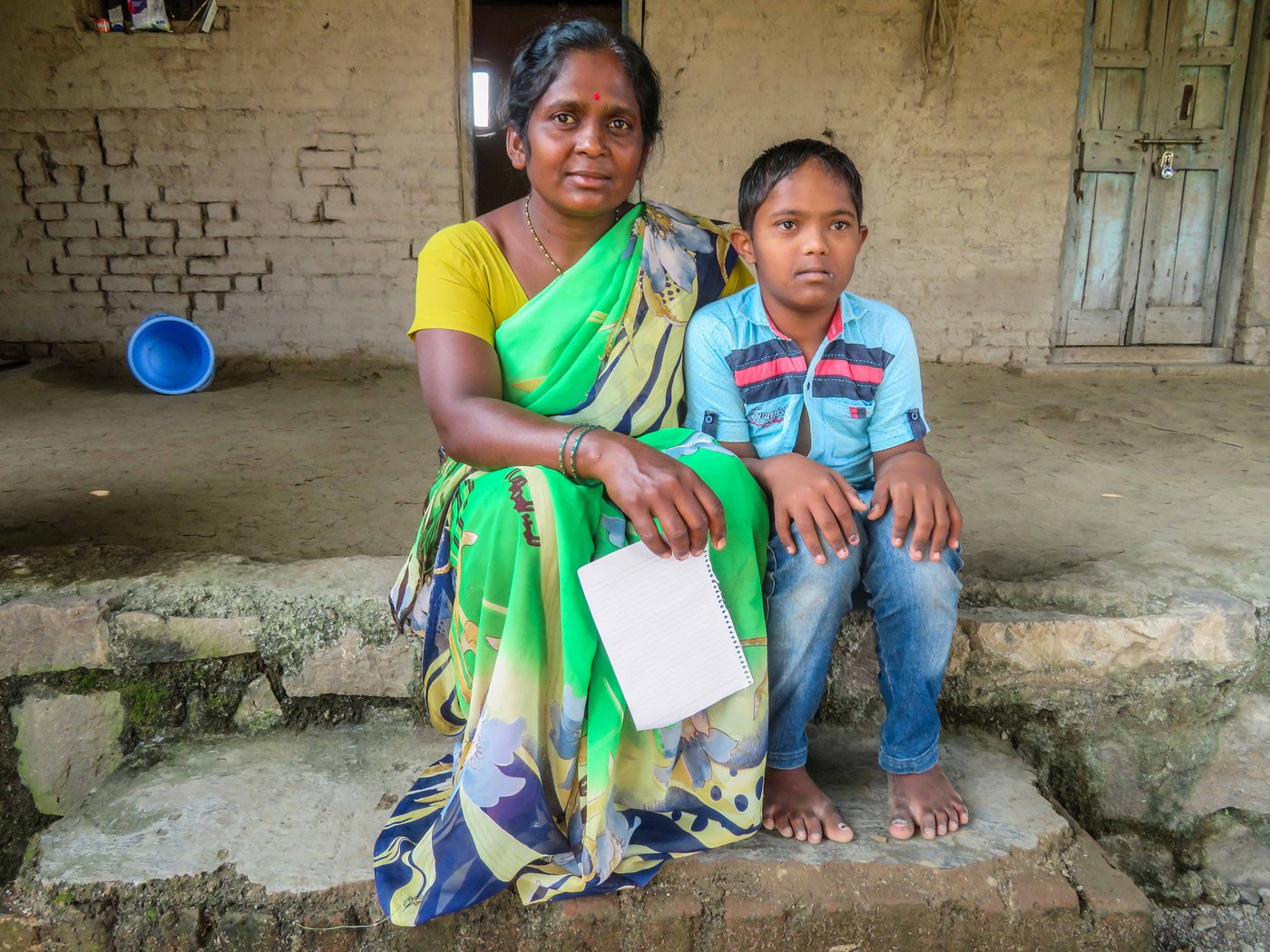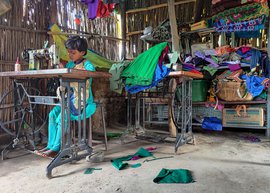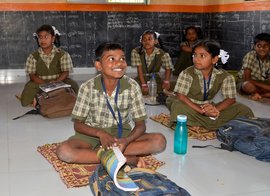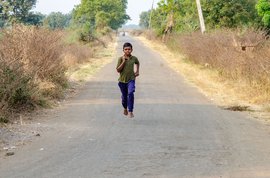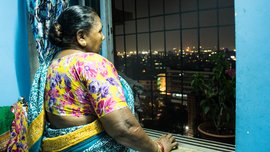“ Shalet jaychay…shalet …Vaibhav…Vaibhav… shalet … [Want to go to school…school…].”
Prateek repeats this, over and over again, calling to a classmate who is not there. He is sitting at the threshold of his one-room mud house, watching a group of children giggle and play nearby. The 13-year-old sits there from morning to evening. Or he stands, leaning against a tree in the front yard, watching his world – one that has rarely extended for nearly 11 months beyond that threshold and the yard with trees and a cow shed.
The other children in Rashin village don’t play with Prateek. “The kids here don’t understand what he says. He remains alone,” explains his 32-year-old mother, Sharada Raut. She noticed signs early on that Prateek was different from other boys in the village, and even from her older child. He was unable to articulate much or take care of himself till he was 10.
When he was eight, Prateek was diagnosed with mild Down’s Syndrome at the government-run Shri Chatrapati Sivaji Maharaj Sarvopchar Rugnalay in Solapur, around 160 kilometres from his village in Karjat taluka of Ahmadnagar district. “Till the age of 10 he could not talk,” Sharada recalls. “But then he started going to school and since then he has been calling me aai [mother]. He goes to the toilet and bathes on his own. The school is important to my son. He has learned a few alphabets, and he can improve if he continues. But this mahamari [pandemic]!” she exclaims.
At the start of the Covid-19 pandemic in March 2020 the residential school that Prateek attended closed its campus. He was one among 25 students with intellectual disabilities– all boys, ages ranging from 6 to 18 – who were sent back to their families.
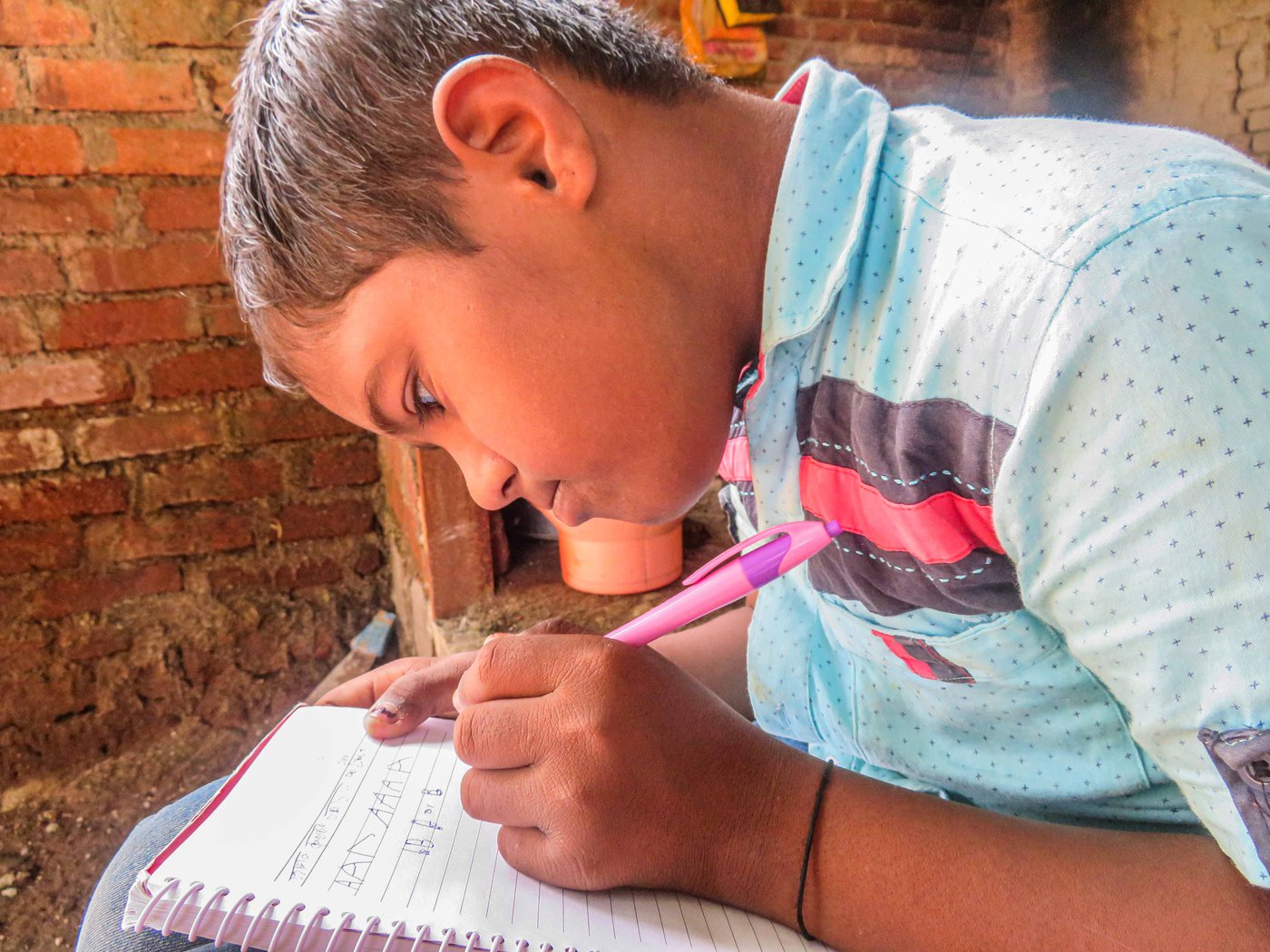
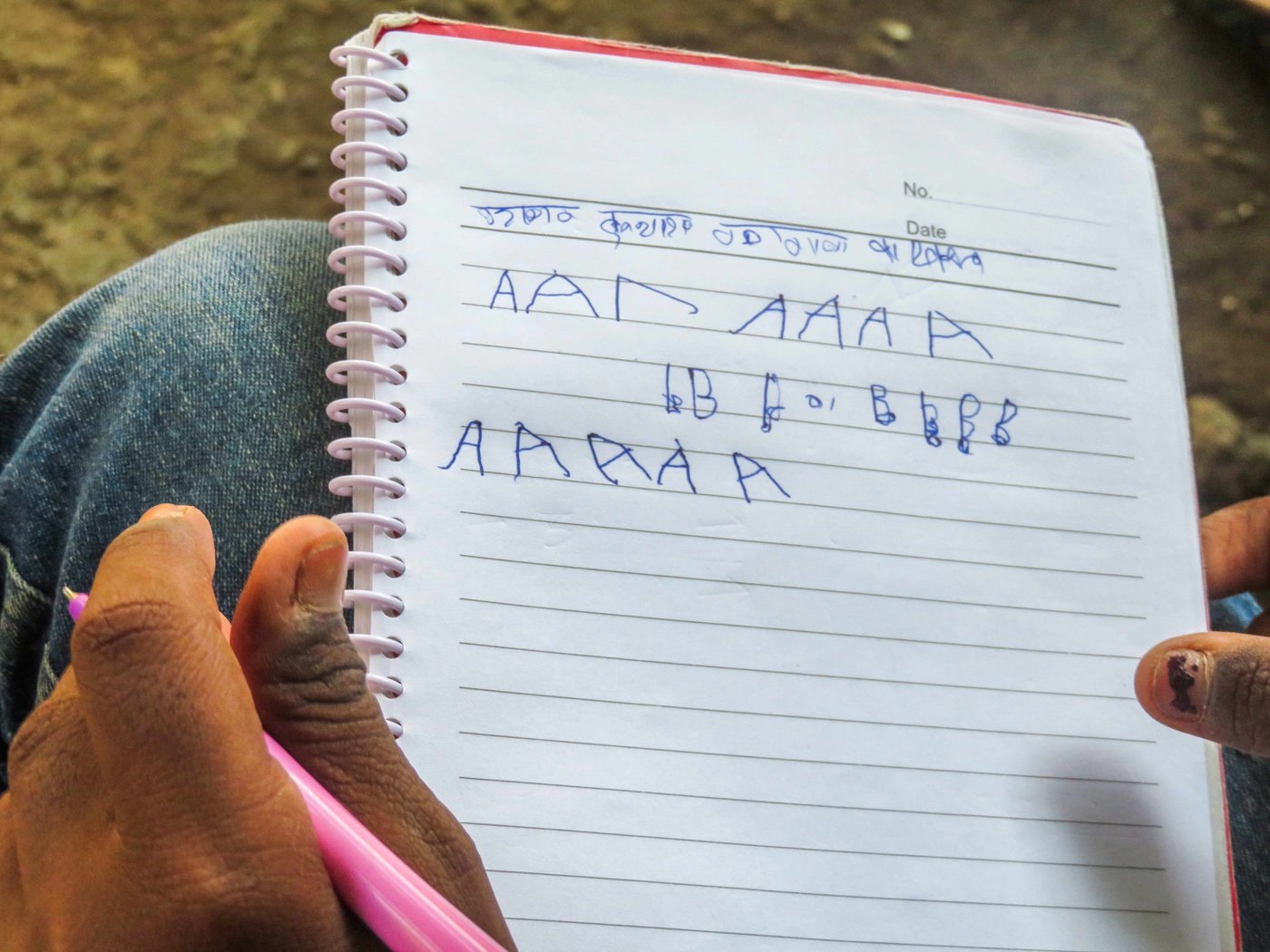
Prateek Raut sometimes tried to write a few alphabets, but with the school break extending to 11 months, he is forgetting all that he learnt, worries his mother
Prateek had started attending school in 2018 when a relative informed his mother about the residential Dnyanprabodhan Matimand Niwasi Vidyalaya for children with intellectual disabilities, in Karmala taluka of Solapur district. It's located roughly10 kilometres from Prateek’s village. The school, run the Shramik Mahila Mandal, a Thane-based NGO, is free for students and entails no expenses for the families.
Four teachers at the Vidyalaya, during classes that run from 10 a.m. to 4:30 from Monday to Friday, and for fewer hours on Saturday, guide and train the students in speech therapy, physical exercise, self-care, paper craft, language skills, identifying numbers, colours and objects, and other activities.
But the lockdown brought to an end Prakeet’s school routine and schedule, his interactions with teachers and other students. At home, he sometimes tried to write a few alphabets in Marathi and English on his own – a , aa , e … abcd – from the lessons he had learnt at school before it closed in March.
But with the break that’s extended to 11 months, he is forgetting all that he learnt, worries Sharada. She says that Prateek has stopped writing alphabets since December. “When he returned in March, he was very calm,”she adds. ‘But as the months passed, he has become very irritable and responds with anger even if I ask him anything lovingly.”
The schedule and training the school provided is very important for kids with intellectual disabilities, says Dr. Mona Gajre, paediatric neurologist, developmental disorders’ specialist and professor at the Lokmanya Tilak Municipal General Hospital in Sion in north-central Mumbai. Explaining the importance of special schools where “each task is broken into a number of small steps” she says that the process of patiently and repeatedly demonstrating each step “makes memorisation and automaticity of the task easy. If there is no continuity, children [with intellectual disabilities] tend to forget learned things sometimes within a span of few months.”
To keep children connected with their learning, Prateek’s school had sent some educational material with the students when they came back home. But Sharada finds it difficult to take attend to Prateek’s lessons. “His teacher gave colour and alphabets charts, but he doesn’t listen to us and we also have to work,” she says. Sharada, who has studied till Class 10, takes care of the household tasks and works on the family’s two-acre farm along with her husband Dattatray Raut, who is in his 40s.
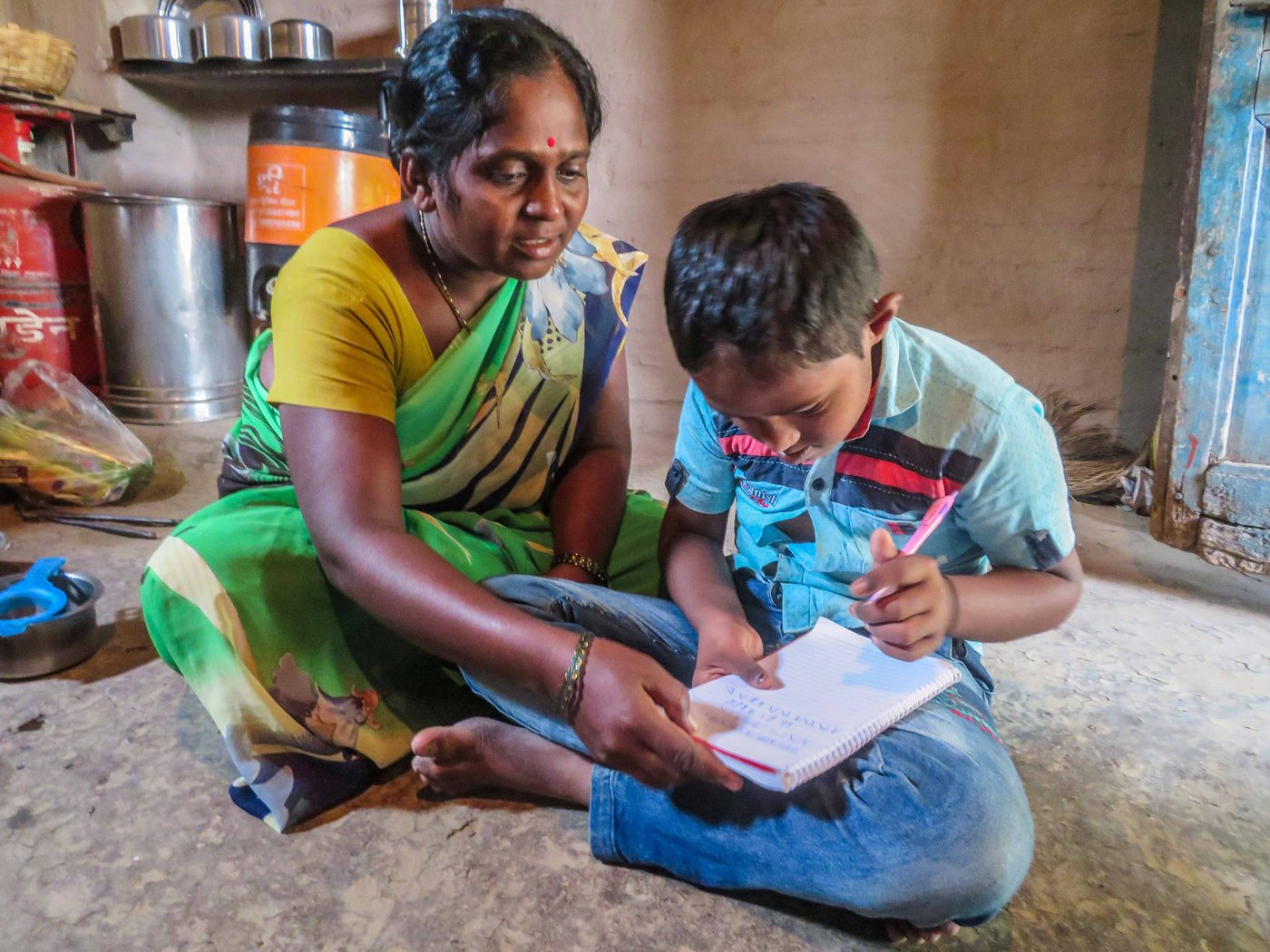
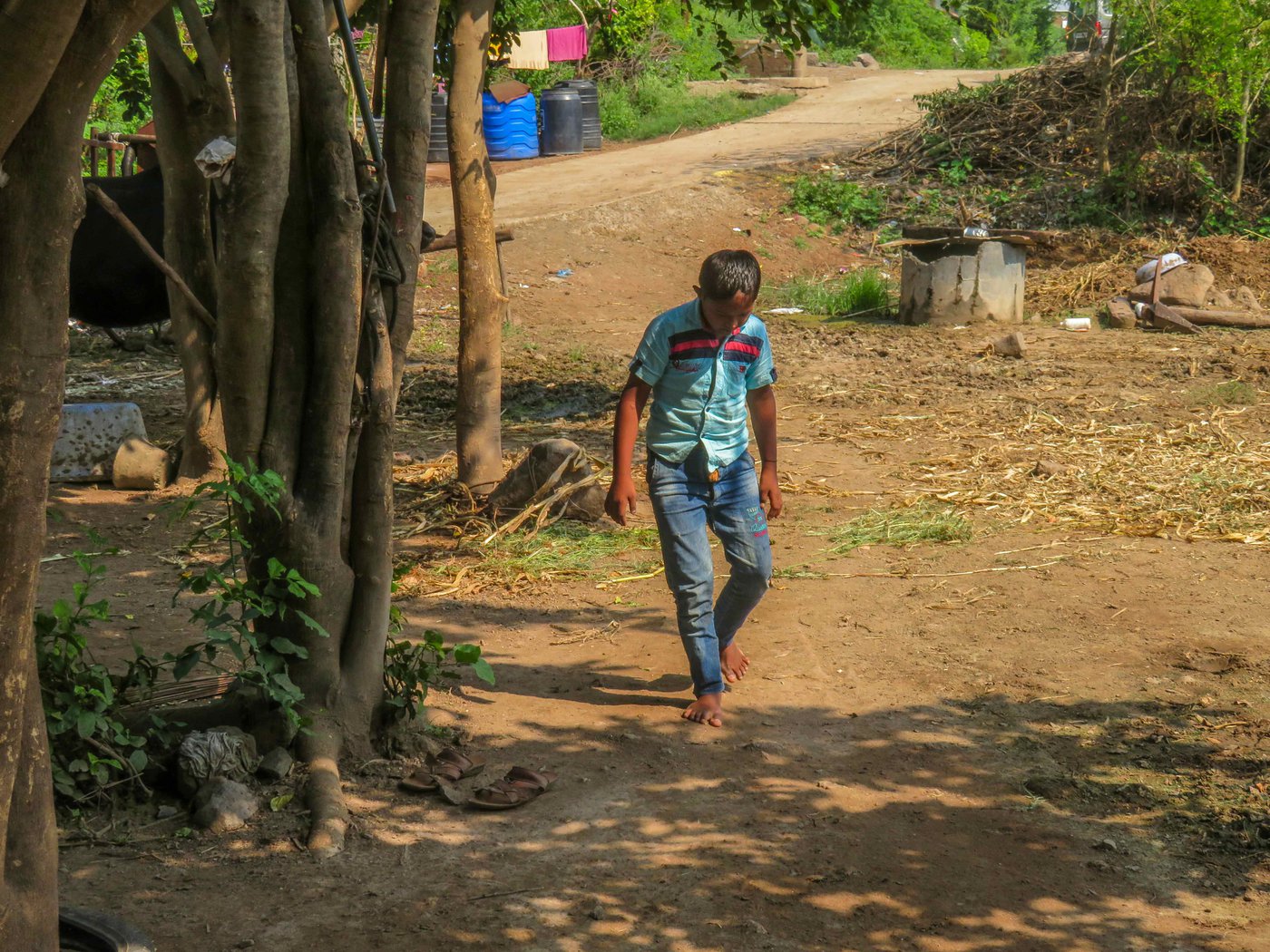
'His teacher gave colour and alphabets charts, but he doesn’t listen to us and we also have to work', says Sharada, who handles housework and farm work
They cultivate jowar and bajra during the kharif season for their family’s consumption. “From November to May, we work on others’ farm for 20-25 days of the month,” says Sharada. Their total monthly income does not exceed Rs. 6,000. Neither parent can afford to sit at home to help their son – this would mean a loss of wages in their already stretched finances.
Prateek’s elder brother, 18-year-old Vicky, studies in a taluka college in Class 12, and also does not have extended time to help his brother. He has been attending online classes (after the lockdown), but since no one in the family has a smartphone, goes to a friend’s house in the village to study there on his mobile.
While online education has been a challenge for all children (See
Online classes, offline class divisions
)
, it poses greater obstacles for children with intellectual disability – those who have managed to enrol in school. Only 185,086 of the 400,000 intellectually disabled children in the 5 to 19 age group (of India’s over 500,000 lakh intellectually disabled kids) are attending any educational institution, notes Census 2011.
Many of these institutions received directives from the government during the lockdown. A June 10, 2020, letter from the Commissionerate for Persons with Disabilities (of the government of Maharashtra) to the Department of Social Justice and Special Assistance, asked for approval for online education of special students during the pandemic. The letter said: “Action should be taken to provide special education to the children through their parents by using the educational materials available on the website of National Institute for the Empowerment of Persons with Intellectual Disabilities, Kharghar, Navi Mumbai, district Thane, as well as by supplying these educational materials to the parents as required.”
Prateek’s school, Dnyanprabodhan Vidyalaya, sent parents teaching material to parents – charts with alphabets, numbers and objects, exercises about poems and songs, and other learning aids, and had phone conversations with parents to guide them. Rohit Bagade, the programme coordinator at the school, says he has been taking regular updates about the children and instructing parents over the phone.
But the parents of all 25 students, Bagade says, work at brick kilns or as agricultural laborers or they are marginal farmers. “Parents should sit with the kid [for lessons], but staying back home for a child affects their daily wage,” he adds. “So Prateek or others have no option but just sit idly. Daily activities and games make them self-reliant and control their irritability and aggression. It’s difficult to conduct such activities online, the kids need personal attention.”
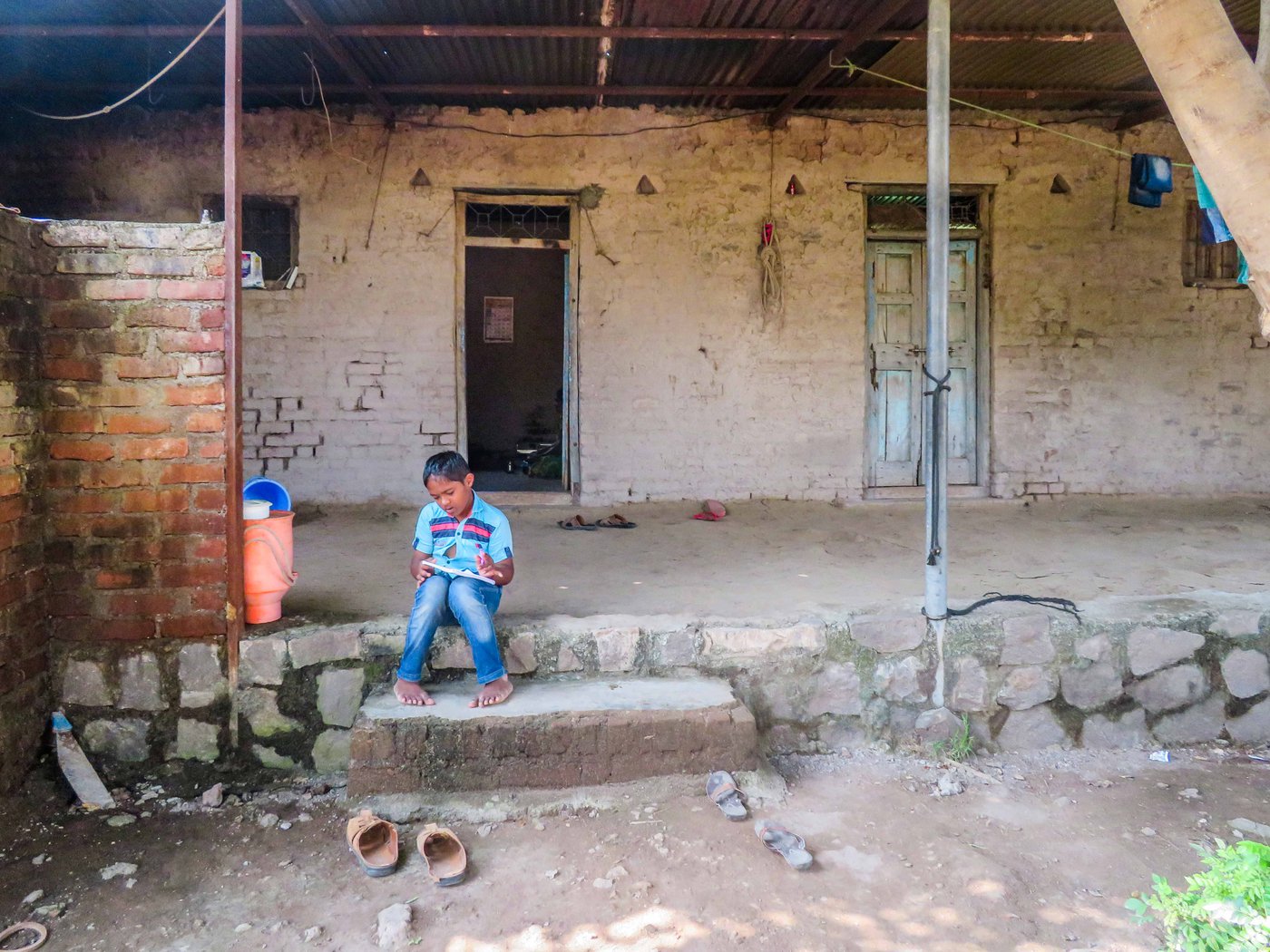
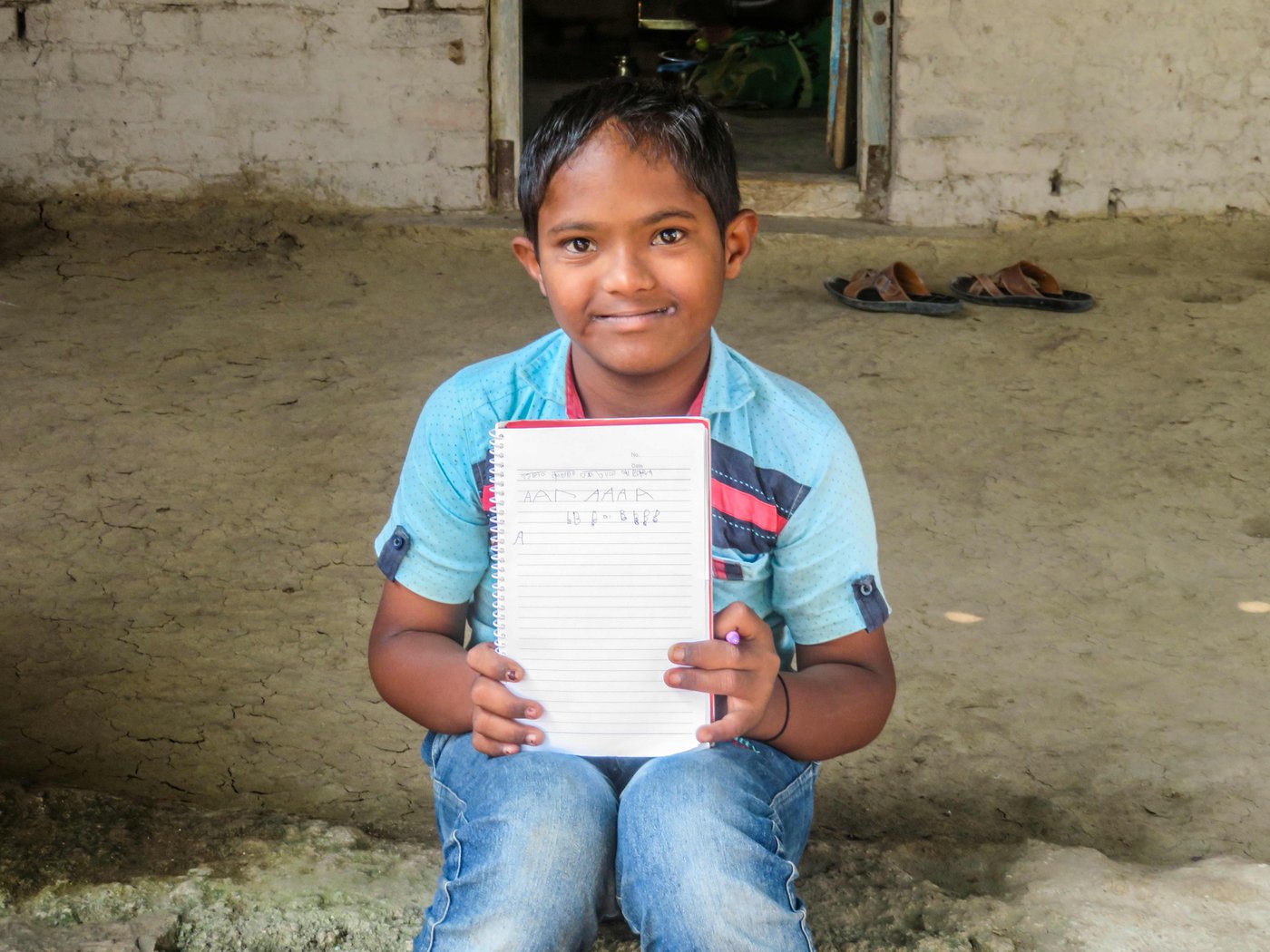
With school shut, Prateek spends his days sitting at the threshold of his one-room mud house, watching a world restricted now to the front yard
The Vidyalaya’s closure has also impacted 18-year-old Sanket Humbe, another student with intellectual disability.in Rashin – a village of around 12,600 people. Since March, he has just been sitting all day on an iron cot below an asbestos roof in the yard of his pucca house, looking down and humming for hours on end. (Besides, the school takes in students only till the age of 18; after that they usually just stay at home. There are a few vocational training institutes in Karjat taluka , but for these parents have to pay fees that they can’t afford with modest farm incomes).
Diagnosed with ‘profound mental retardment’ (as noted in his medical reports) at the age of six, Sanket cannot speak and suffers from recurring epilepsy attacks that require regular medication. In 2017, when he was 15, his mother, 39-year-old Manisha, sent him to school for the first time after the ASHA worker (accredited social health activist), in the village advised her about it.
“Earlier we had to make him wear his clothes, give him a bath, and help him with using the toilet. He used to get restless seeing people around him. But he had improved a lot after he went to school,” says Manisha.
With the school closed for around 11 months now, he has forgotten his self-care training in using a toilet. “A few weeks after he came home in March, he would soil his trousers and apply the faeces on his body and the walls,” says Manisha.
With the school remaining closed, first for weeks and then for months, her anxieties have grown. Sanket often becomes aggressive, stubborn and sleepless. “Sometimes he doesn’t sleep through the night. Just sits on the bed, swaying back and forth,” says Manisha.
She has been staying with her son and 19-year-old daughter Rutuja at her parents’ place in Rashin village after her husband, a farmer, died by suicide in 2010, when he was just 30. (Rutuja is studying for a BA degree by correspondence and for that stays at a maternal aunt’s house in Thane district’s Badlapur city). Manisha works throughout the year on the seven acres that her parents own. The family cultivates, with the help of labourers, maize and jowar in the kharif as well as rabi seasons.
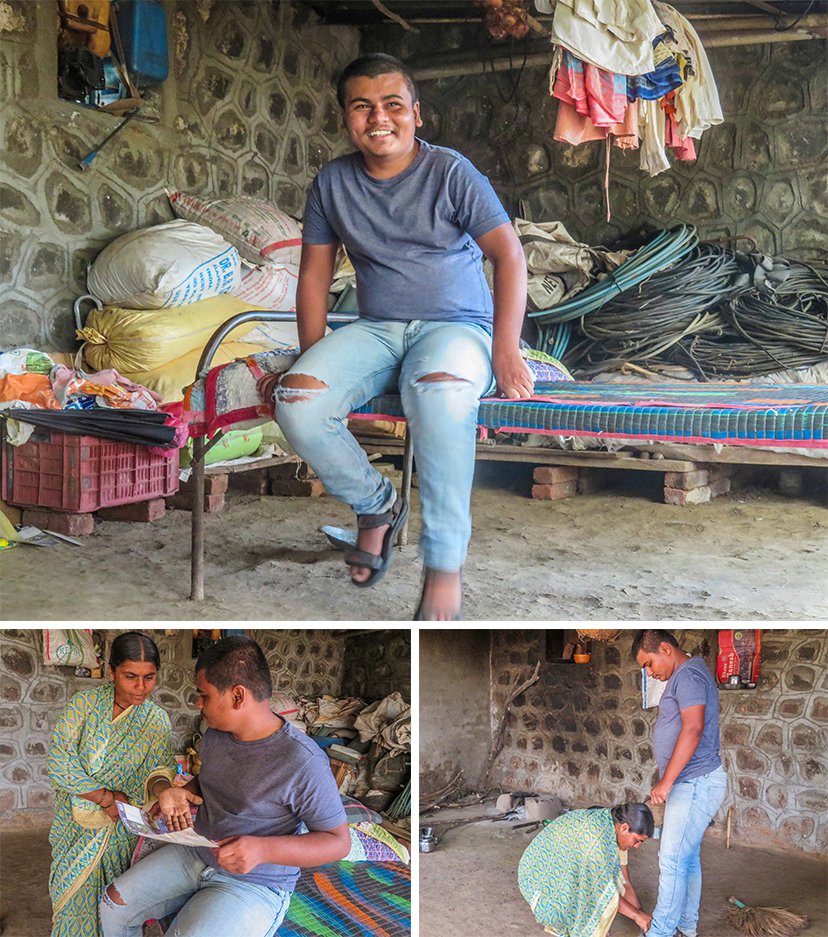
Sanket Humbe's mother Manisha tries to teach him after she returns from the farm. But he often becomes aggressive and stubborn: 'Sometimes he doesn’t sleep through the night. Just sits on the bed, swaying back and forth'
“My parents are both above 80,” says Manisha, “and they can’t handle Sanket. Even if they ask something very lovingly, he pushes them, throws things at them, and screams loudly.” But neither can she stay at home all the time. “Who will work then? And what we will eat?” she asks.
Sanket wasn’t as aggressive when he returned from school in March. “He used to come to the farm with me,” she adds, “and helped carry fodder on his head for our cattle. But he suddenly stopped coming in September.” If Manisha insisted he accompany her, Sanket would kick or hit her. “I can’t get angry with him. For a mother all her children are equal. Whatever he is like, he is a part of my heart,” she says.
Manisha has studied till Class 10 and tries to teach Sanket how to identify objects with the help of a picture chart from the school. This lesson takes place after she returns from the farm, and while doing household tasks. “He just runs away from me if I show the chart,” she complains, “and sits somewhere else. He doesn’t listen,”
At home, the absence of the school routine, of regular activities, playing games with other kids in the school, learning with educational tools and continuous self-care training, can trigger behavioural issues among children with severe and profound intellectual disability, says Rohit Bagade.
Even if their families had a smartphone or laptop and steady network access, for kids with intellectual disabilities attending physical classes is important, he says. “Besides, teaching a special child requires a lot of patience, and it is difficult for parents to keep talking or convincing the child until he understands a particular task,” Bagade adds. “Parents are not used to this, so they lose patience and simply give up, saying that the child doesn’t listen to them.”
“For the education of intellectually disabled children, consistency is the key factor,” explains Dr. Gajre of Mumbai’s Lokmanya Tilak Municipal General Hospital. But, she notes, the pandemic-driven closure of schools has deprived many children with disabilities of their special education, made them increasingly dependent, and increased their dropout rates. “Online learning cannot replace offline therapy and training, especially in intellectually disabled kids. From early March we started training 35 special kids online. By October we noticed that the number of kids reduced significantly [to around 8-10],” adds Dr. Gajre, about enrolment at the hospital’s Autism Intervention Centre.
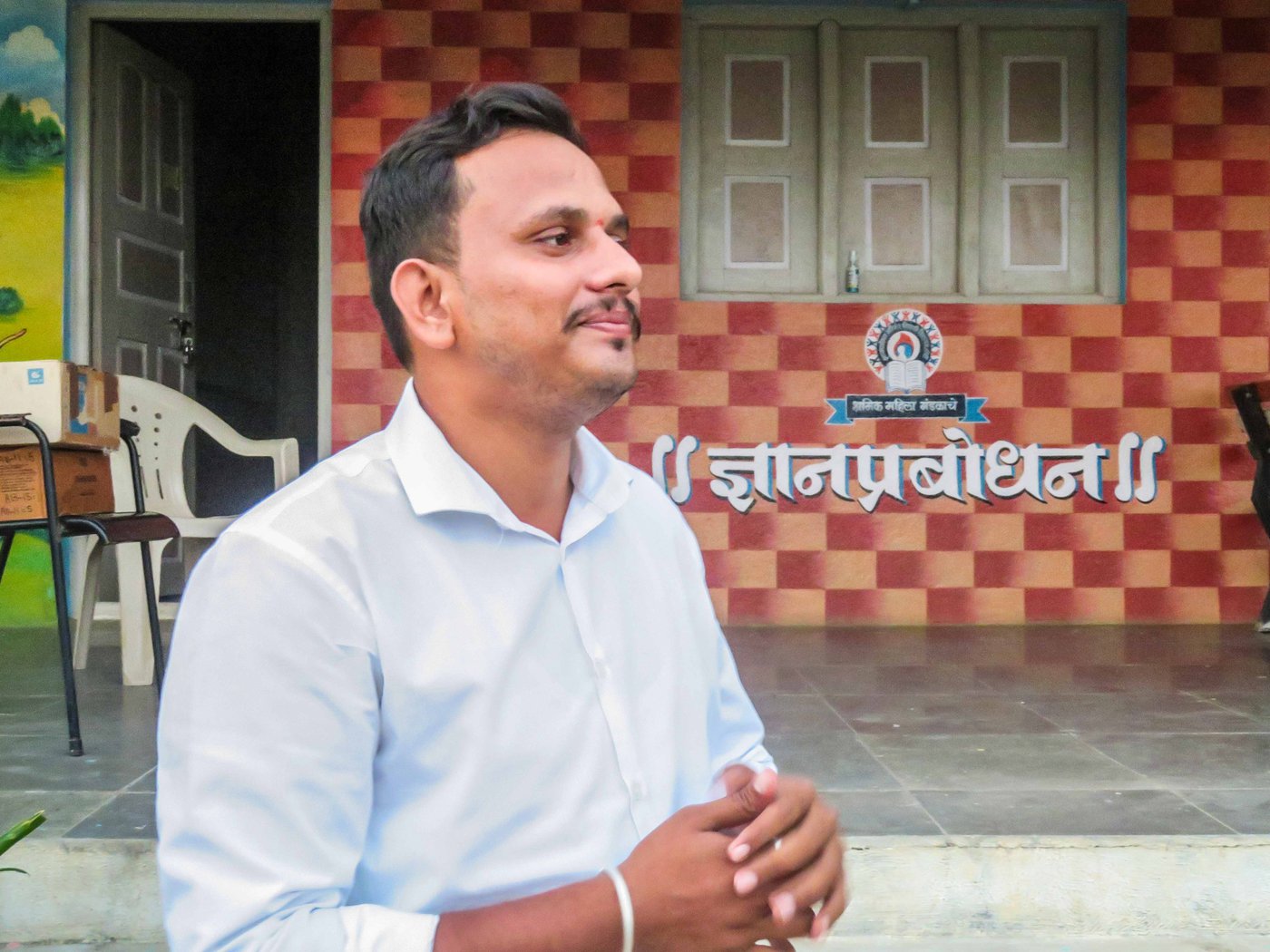
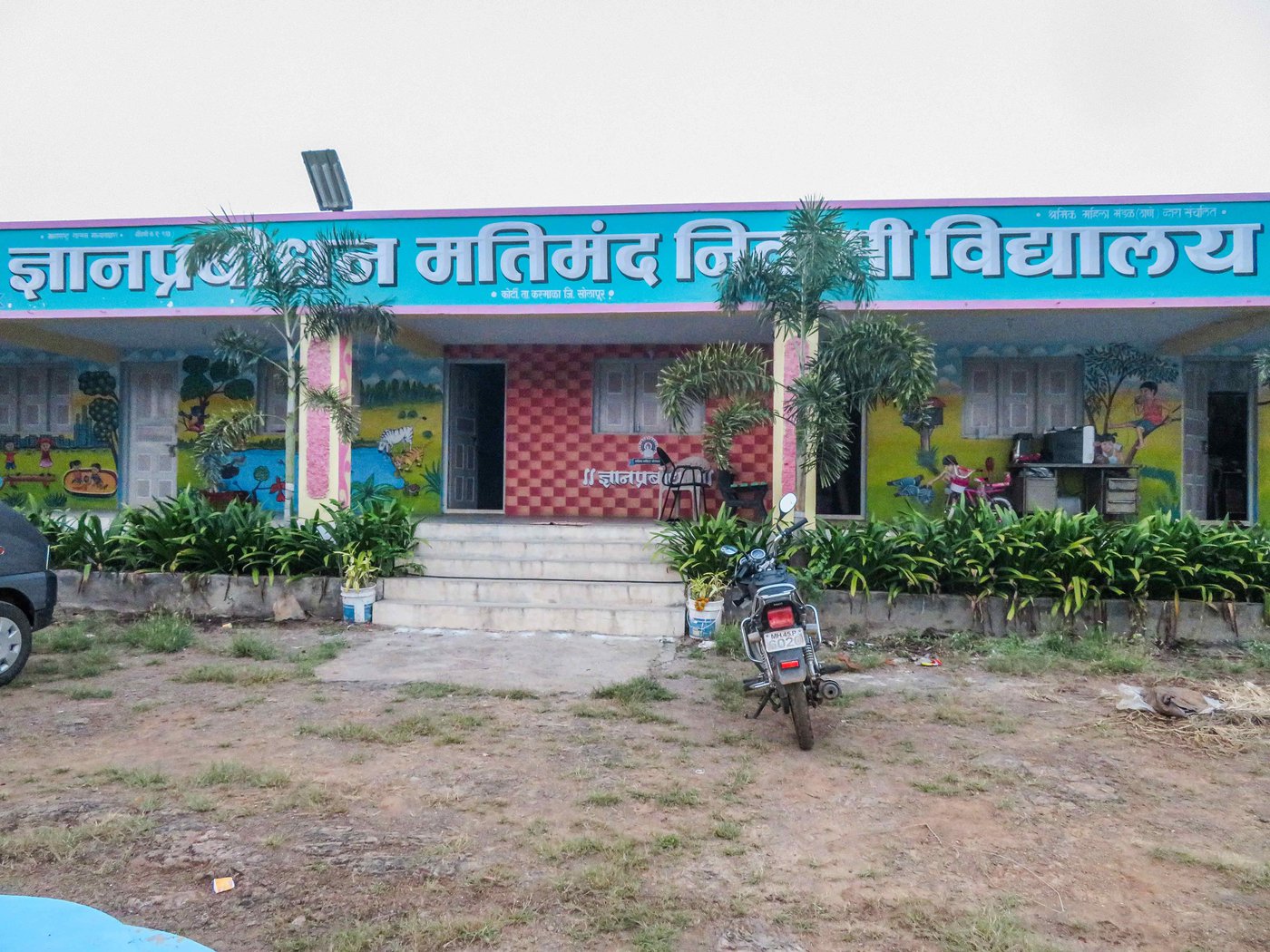
Rohit Bagade, the programme coordinator at the Dnyanprabodhan Matimand Niwasi Vidyalaya, says that an absence of the school routine and continuous self-care training can trigger behavioural issues among children with intellectual disability
In Maharashtra, there are there are nearly 1,100 government aided and non-aided special residential schools for children who are visually impaired, have hearing disabilities, are intellectually challenged or have other special needs, estimates Vijay Kanhekar, coordinator of the Disability Rights Forum of the Yashwantrao Chavan Pratishthan (a non-government Trust). All these schools, Kanhekar says, are currently closed in Maharashtra.
But re-starting school and actual classes as before is also going to be difficult for Prateek’s and Sanket’s school, which, while it has permission from the state government to operate, does not receive any aid despite numerous letters seeking this assistance from the state’s School Education and Sports Department. Since March, the school has not received any fresh donations as well (from a few trusts and individuals), making re-opening even more difficult.
“We don’t charge any fees from parents, so donations are important. And especially during the pandemic, the school should be well equipped with safety measures like PPE kits for our helpers and teachers, because our kids already have health conditions,” says Bagade.
“All residential school in rural Maharashtra are currently shut,” adds Vijay Kanhekar, “and the children are at home with no activity. It is making kids aggressive, and also affecting the mental health of parents struggling to handle a special child.”
His forum has been seeking assistance to create safe special schools – “A Covid centre-level special school with all protocols and safety measures” says Kanhekar — and has petitioned the Social Justice and Special Assistance Department of Maharashtra. Kanhekar also insists that children with disabilities should be among the first to get the Covid-19 vaccine.
For now, with no school, no regular activities, no friends, and little to do and learn anew, Prateek and Sanket are passing their days just sitting around their front yards, mostly alone. They perhaps do not have a real sense of the pandemic, though Prateek watches Covid-related advisories on TV sometimes and says, “Colona…colona … colona…”
